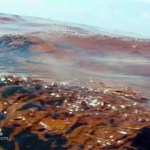BP
tags: A Bird's Eye View of the BP Oil Spill, oil drilling, oil spill, oil wells, petroleum, BP, British Petroleum, TransOcean, environment, animals, streaming video
This news report of the BP oil spill in the Gulf of Mexico features a "bird's eye view" of the spill, including footage of the pelican rookery filled with oiled adult birds and a dead dolphin. Nothing like taking a close look at the REAL victims of this disaster!
tags: Graphic Depiction of Gulf Oil Spill, environment, infographic, Deepwater Horizon, BP, British PetroleumTransOcean
Below the fold (due to its large size) is an infographic depiction of the Gulf oil spill, including a timeline of the spill, the numbers of lives impacted, and last but not least, a graphic that compares this leak to others. You'll be astonished to see just how small this spill is compared to the Iraq war "spill" where more than 500 million gallons of oil were intentionally dumped into the environment. The scale of our greed is truly sickening.
Data sourced from BBC.…
I was on the phone this afternoon with a friend at what I'll describe as a highly respected national-type newspaper, and we almost simultaneously broke into complaint about the National Oceanic and Atmospheric Administration (NOAA).
What set us off was NOAA's grudging admission of the day, that despite angry earlier denials, there were indeed swathes of oil-saturated water coiling for miles, under the surface of the Gulf, emanating away from the site of the BP pipe break.
As The New York Times noted: "the tests confirmed that some toxic compounds that would normally be expected to…
Melanie Trottman reported in the Wall Street Journal last week that US Representatives James Oberstar and Jerrold Nadler have demanded that Gulf response and recovery workers be provided with respirators (among other protective equipment), but OSHA doesn't think respirators should be required:
David Michaels, assistant secretary for the Department of Labor's OSHA, said in an interview Thursday that based on test results so far, cleanup workers are receiving "minimal" exposure to airborne toxins. OSHA will require that BP provide certain protective clothing, but not respirators.
The "based on…
tags: Care for Some Crude With Your Sushi?, toro sushi, maguro sushi, Atlantic Bluefin Tuna, Thunnus thynnus, Gulf of Mexico, pollution, oil spill, Deepwater Horizon, BP, British Petroleum, overfishing, endangered species, conservation, marine biology, streaming video
The Gulf of Mexico oil spill is the worst environmental disaster the US has faced. Toxic oil from the Deepwater Horizon well threatens the region's sensitive shorelines and the nesting birds along the Louisiana coast. But there's another species at serious risk: the Atlantic bluefin tuna, Thunnus thynnus. This disturbing video…
(Just a note: The giveaway period for the audiobook of The Poisoner's Handbook has ended. If your comment is not published, it's too late to be considered for a free copy. But still glad to hear your ideas! Winners to be notified on Wednesday).
One of the most interesting - and I think important - comment threads on this blog has concerned risks posed by the gas methane, blamed (along with BP) for the devastating oil spill in April and still seeping into the water from the broken drill pipe.
"We don't know the composition of the crude oil as it is leaving the well head. This crude is…
By Elizabeth Grossman
Expressions of concern for oil spill response workers' health and safety grew this past week as reports arrived by way of the Louisiana Environmental Action Network that BP was denying workers' requests for respirators. On June 4th, the Wall Street Journal reported that Representatives Jerrold Nadler (D-NY) and James Oberstar (D-Minn) had written to the EPA and Department of Labor demanding that all response workers be provided with "proper protective equipment, including respirators."
Anna Hrybyk, program manager of the Louisiana Bucket Brigade, also reports that in…
The second post I wrote for this blog was partly to explain the title:
"Why Speakeasy Science? Well, first because I just wrote a book, The Poisoner's Handbook, which is set in Jazz-Age New York, which was home to some 30,000 speakeasies. Also I like the historical feel of the name. I've always been interested in the intersection of science and culture and I find moments in history, where those two forces pull at each other, to be wonderfully illuminating. Speakeasy itself appeals to my sense of word play - I like the idea of speaking easily about science. And finally - some science…
DemFromCT had a great post up at Daily Kos this past weekend about risk communication. He considers the somewhat unusual circumstances of the Gulf oil spill, noting, "unlike pandemics and hurricanes, this volatile mixture in the water has an equally volatile mix of politics, companies, government and media to sort out policy and communication." The post also includes insights from risk communication expert Peter Sandman, who (with input from Jody Lanard) gave a detailed response to this question from DemFromCT:
Given the potential for failure of the top kill approach, and the length of time…
So, at a Sunday news briefing, British Petroleum's CEO, Tony Hayward, announced that there are no underwater plumes of oil resulting from the April accident at the company's Deepwater Horizon rig in the Gulf of Mexico.
Why? Well, first BP's testing hasn't found any such evidence. And second, Hayward reminds us that, you know, oil floats. Or if we didn't get that: "Oil has a specific gravity that's about half that of water. It wants to get to the surface because of the difference in specific gravity."
Let's give the man this: there is definitely oil floating on the surface…
by Elizabeth Grossman
As of Saturday afternoon, May 29th, ten oil spill clean-up workers had been admitted to West Jefferson Medical Center (WJMC) in Marrero, Louisiana. All but two have been hospitalized suffering from chest pains, dizziness, headaches, and nausea. One crewmember admitted on the 29th had fallen and hit his head on a stair after wave mixed with oil had washed onto a deck, hospital spokesperson Taslin Alonzo told me about three hours after two workers were admitted Saturday. The other, who was working on what Alonzo called "an oil rig," was suffering from hypertension. All…
In a recent discussion on this blog, an interesting thread appeared: the idea that BP's heavy use of chemical dispersants to break up the Gulf oil spill was as much damage cover up as damage control.
Here are a few examples:
My suspicion is that the main reason they used these dispersants was to hide the oil from view.... Anything that will keep the oil out of site below the surface allows them a certain measure of plausible deniability regarding their knowledge of the spills true magnitude.
I think there is a big effort on the part of BP to minimize the aesthetic and…
By Elizabeth Grossman
"All the data shows no toxic air concentrations from the oil spill where work is being performed," is what OSHA spokesperson Jason Surbey told me on Friday, May 21st.
But on the afternoon of May 26th, after crew members of three "vessels of opportunity" working in the Breton Sound area of the Gulf reported experiencing nausea, dizziness, headaches, and chest pains - and one was medevaced by air to West Jefferson Hospital in Marrero, Louisiana and two others taken to the same hospital by ambulance - the Unified Command recalled all vessels of opportunity working in that…
There remain more questions than answers at this point, but the BP spin from yesterday that "Top Kill" was working appears to have been a falsehood. BP is not the right source for what the actual data from the well head means, but unfortunately they are the only source of said data.
I would like to offer interested readers a couple of better sources of technical information.
This is the live feed from 5000 ft below the Gulf of Mexico.
Apparently what this is showing now (11:02 AM Pacific time) is alot of drilling mud being ejected. This mud is what is intended to counteract the upward…
The latest news from the Gulf of Mexico offers both relief (the "top kill" approach to ending the oil spill may be working) and dismay (the amount of oil pouring into the water is now thought to be closer to 20,000 barrels a day rather than the 5,000 barrels that BP has insisted on for weeks.)
In other words - at worst case - the U.S. Geological Survey estimates that the spill amount may be closer to 39 million gallons of oil so far, rather than the 11 million previously suspected. Now, I've spent the last week or so focusing on the chemical dispersants used to break down the oil,…
tags: Hazmat Dive into the Middle of the Gulf Oil Spill, Corexit, environment, Gulf oil spill, BP, British Petroleum, chemical dispersants, Philippe Cousteau Jr., Sam Champion, television, streaming video
What is the chemical dispersant, Corexit, doing to the oil in the Gulf? This video follows Philippe Cousteau Jr. and Sam Champion as they dive into Gulf's oily waters wearing hazmat uniforms. Their video shows that the oil is being broken up into tiny droplets that coat everything in their path ... birds, fish, whales, boats, the bottom of the sea and people in hazmat suits ... these small…
On today's Morning Edition, Russell Lewis reported on the memorial service held in Jackson, Mississippi for the 11 workers who died when the Deepwater Horizon oil rig exploded on April 20th. Host David Greene noted that they've been called the "Forgotten 11," because so much attention has been focused on the oil leak rather than the lost workers.
The following workers were killed in the explosion:
Jason Anderson, 35, Bay City, TX
Aaron Dale Burkeen, 37, Philadelphia, MS
Donald Clark, 49, Newellton, LA
Stephen Curtis, 39, Georgetown, LA
Roy Wyatt Kemp, 27, Jonesville, LA
Karl Kleppinger…
In the past week, a lot of writers - and, yes, that includes me - have focused on the chemical dispersants being sprayed into the Gulf of Mexico to help manage the ever-expanding oil spill from BP's deepwater drilling rig.
For instance, I recently pointed out while dispersants do help break apart a slick into smaller and more biodegradable fragments, dispersed oil is a great deal more poisonous than crude oil. Further, that post, A Lethal Concentration, generated a great discussion, and one that taught me a lot.
I hadn't considered that the thriving bacterial colonies of warm…
I began writing this post as an open letter to Senator Graham and Administrator Reilly as they embarked in their work as co-chairs of the Presidential Commission on the BP Deepwater Horizon oil rig catastrophe. I planned to urge them to read investigation reports on the BP Texas City disaster because both the US Chemical Safety Board and the Baker Panel challenged BP (and others in the oil and gas sector) from using "lost-time injury rates" to assess safety performance.
I quickly learned, however, that Mr. Graham and Mr. Reilly are not the only individuals who should read these reports. I'…
So, yesterday, a friend of mine suggested that BP should stand for Barren Planet rather than British Petroleum.
And today The New York Times reported that despite all the evidence that BP's favorite dispersant (yes, Corexit) is more poisonous and less effective than others on the market, and despite the fact that the EPA order the company to find an alternative by, um, yesterday, the company was still dumping the same old, same old chemical compounds into the Gulf of Mexico.
Despite the fact that there are 11 other approved dispersants on the EPA list.
Talk about warning…

